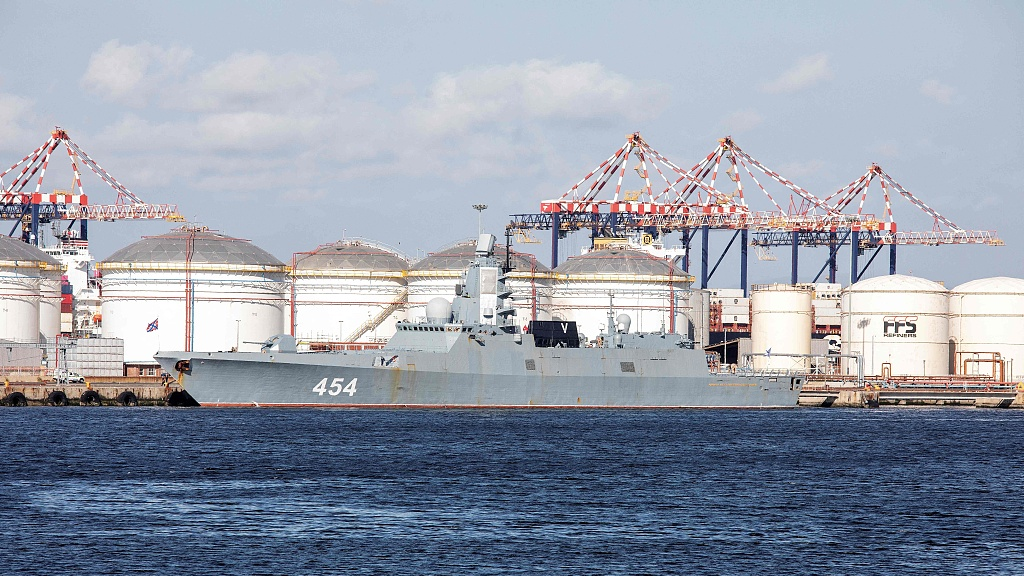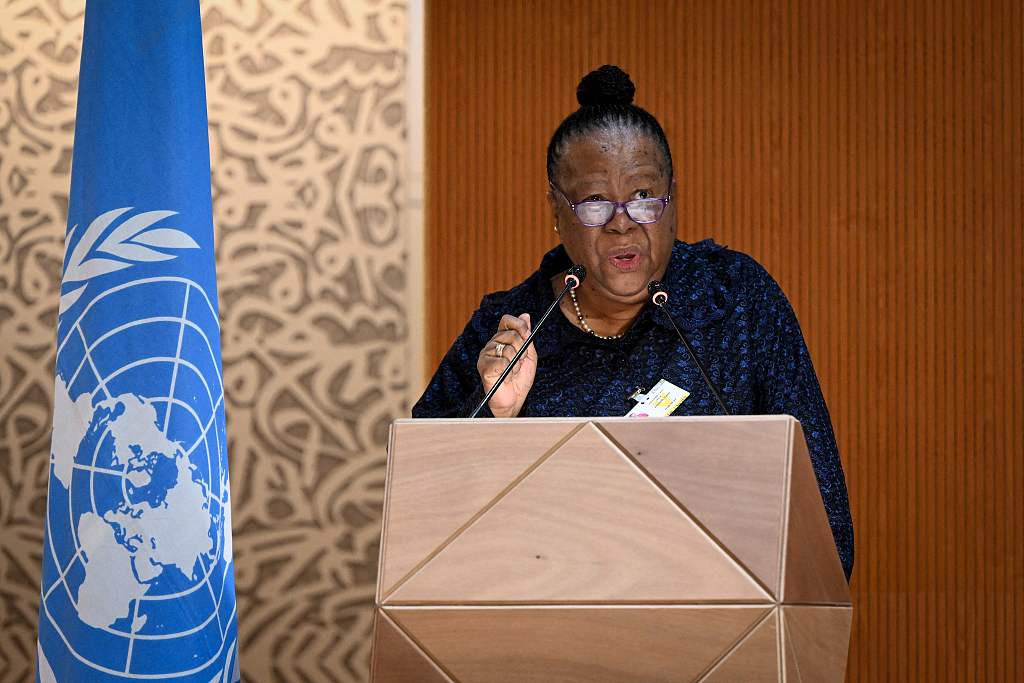
Ahead of a 10-day joint maritime drills exercised by Russia, South Africa and China, a Russian military frigate docked in the harbour of Cape Town, South Africa, February 13, 2023. /VCG
Ahead of a 10-day joint maritime drills exercised by Russia, South Africa and China, a Russian military frigate docked in the harbour of Cape Town, South Africa, February 13, 2023. /VCG
Editor's Note: Zhou Wenxing is assistant professor at School of International Studies, Nanjing University and former Asia Fellow at John F. Kennedy School, Harvard University. He writes extensively on comparative politics and international relations, with an emphasis on the Taiwan question and China-U.S. relations. The article reflects the author's opinions, and not necessarily the views of CGTN.
A 10-day naval exercise named Mosi ("Smoke" in Swahili) is taking place off South Africa's east coast Durban to Richard's Bay this February, jointly conducted by China, South Africa and Russia. It's the second time the three countries have held joint operations. Nonetheless, the drill has irked Western-based media outlets and governments.
Against the backdrop of the Russia-Ukraine conflict, the drill has annoyed the U.S. and other Western countries, since they suffer from a "taking sides syndrome," believing that everyone should take sides over the Russia-Ukraine conflict, while condemning sovereign government that refuse to support them.
The first symptom is criticizing all of China's statements and actions connected to the conflict. Nonetheless, China has consistently called on Russia and Ukraine to resolve their conflict through diplomatic channels based on international norms, since the conflict escalated in late February, 2022. But China's neutral stance has confronted groundless accusations from the U.S., claiming China has "taken sides" with Russia and has endangered international stability.
Moreover, America's obsession has spilled over to other corners of the world. The latest case can be witnessed by the pressure Washington imposed on Pretoria. From the U.S. perspective, South Africa's participation in the joint military exercise with Russia means "taking sides" with Russia. But Washington is incorrect. South African Minister of International Relations and Cooperation Naledi Pandor said in an interview last month, the drill "is just a natural set of exercises that occur between countries." Accordingly, some countries can perform such exercises but others do not. Pandor condemned the U.S.'s criticisms, which reflects its "double-standards" over handling international issues.
In recent decades Western countries have played much larger roles in South Africa both economically and militarily. The total trade at the end of 2022 in goods and services of the UK and South Africa was 6.3 percent higher than in the timeframe up to the end of the second quarter in 2021. The South Africa Defense Ministry disclosed that the country has hosted similar military exercises with France, the U.S. and other countries from the Western NATO military alliance. Hence, criticizing South Africa's military exercises with Russia holds no water.

South African Minister of International Relations and Cooperation Naledi Pandor delivers a speech during a session of the UN Human Rights Council in Geneva, on February 28, 2022. /VCG
South African Minister of International Relations and Cooperation Naledi Pandor delivers a speech during a session of the UN Human Rights Council in Geneva, on February 28, 2022. /VCG
Additionally, South Africa's case indicates the reluctance of developing countries to get enmeshed in what Pandor has said that South Africa "will not be dragged into taking sides." This demonstrates the developing countries' growing dissatisfaction with the West.
What is more important for the U.S. is to take a holistic perspective to and carefully deal with the diverse views of other countries around the globe concerning the Russia-Ukraine conflict. Pandor's response reflects how a developing country views U.S. diplomacy and the Russia-Ukraine conflict. The remarks lies in her deep concerns about social development and economic growth, among other domestic issues vis-a-vis international affairs.
South Africa's top priority for the planned drill is to solve shared problems, "such as piracy," said Elizabeth Sidiropoulos, chief executive of the South African Institute of International Affairs. The country doesn't want to get swirled into a so-called great powers competition.
The vast majority of developing countries are more concerned about their domestic situations. While the COVID-19 pandemic is ongoing, global warming is threatening more island countries and most countries still struggle with poverty and food shortages. These countries are not interested in the U.S. foreign policy narrative.
Accordingly, Washington remains obsessed with the "taking sides syndrome." Therefore, the U.S. treats the actions of China, and perhaps any other country that maintains normal diplomatic ties with Moscow with dark-tinted glasses. The vicious cycle that Washington has evoked may only hamper its relations with Beijing and Pretoria.
If the U.S. pursues its world affairs with this syndrome in tact, a rising number of developing countries could alienate themselves from Washington, which will jeopardize U.S.' strategic interests.
(If you want to contribute and have specific expertise, please contact us at opinions@cgtn.com. Follow @thouse_opinions on Twitter to discover the latest commentaries in the CGTN Opinion Section.)